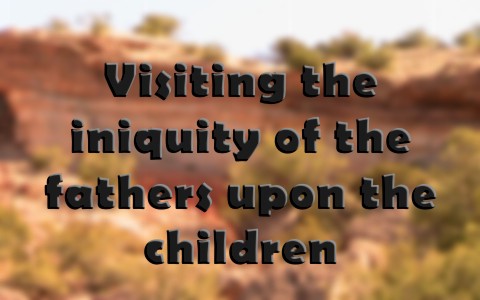
God’s Thoughts and Ways – Part X (Invitation, Refusal, Banishment)
There is a common theme running from the Book of Genesis through the book of The Revelation. That is, God invites people into His presence (God’s MERCY), they refuse, and they are subsequently banished from God’s presence (God’s WRATH).
For example, Adam and Eve (1) could have eaten from the tree of life and lived forever in God’s presence (Genesis 3:22). Instead, they refused, ate from the Tree of the Knowledge of Good and Evil, and were banished from the Garden of Eden, the Garden of God, where God walked with them (Genesis 3:8,23,24).
Israel is invited to be with God at Mount Sinai (1). They refused by running from God and this rebellion ultimately resulted in their banishment and subsequent death in the wilderness. (Exodus 19:16-19; 20:18-21)
God invites the children of Israel to recognize Him as their King. Israel refuses to recognize God as their king and rather chooses a human king (1) (1 Samuel 8:6,7). This ultimately leads to sin and the banishment from God of the whole nation of Israel! (Psalms 78:59. Jeremiah 3:8)
Jesus tells us the same story with a twist (1) – others will be invited to take the place of those banished (cf. Romans 11:17-20).
Jesus spoke to them again in parables, saying: "The kingdom of heaven can be compared to a king who gave a wedding banquet for his son. He sent his slaves to summon those who had been invited to the banquet, but they would not come. Again he sent other slaves, saying, 'Tell those who have been invited, "Look! The feast I have prepared for you is ready. My oxen and fattened cattle have been slaughtered, and everything is ready. Come to the wedding banquet."' But they were indifferent and went away, one to his farm, another to his business. The rest seized his slaves, insolently mistreated them, and killed them. The king was furious! He sent his soldiers, and they put those murderers to death and set their city on fire. Then he said to his slaves, 'The wedding is ready, but the ones who had been invited were not worthy. So go into the main streets and invite everyone you find to the wedding banquet.' And those slaves went out into the streets and gathered all they found, both bad and good, and the wedding hall was filled with guests. But when the king came in to see the wedding guests, he saw a man there who was not wearing wedding clothes. And he said to him, 'Friend, how did you get in here without wedding clothes?' But he had nothing to say. Then the king said to his attendants, 'Tie him up hand and foot and throw him into the outer darkness, where there will be weeping and gnashing of teeth!' For many are called, but few are chosen." (Matthew 22:1-14 NET)
Jesus, the consummate teacher, would use the known to explain the unknown. An unjust judge, a familiar character, was juxtaposed with God the just judge. (Psalms 7:11)
Then Jesus told them a parable to show them they should always pray and not lose heart. He said, "In a certain city there was a judge who neither feared God nor respected people. There was also a widow in that city who kept coming to him and saying, 'Give me justice against my adversary.' For a while he refused, but later on he said to himself, 'Though I neither fear God nor have regard for people, yet because this widow keeps on bothering me, I will give her justice, or in the end she will wear me out by her unending pleas.'" And the Lord said, "Listen to what the unrighteous judge says! Won't God give justice to his chosen ones, who cry out to him day and night? Will he delay long to help them? I tell you, he will give them justice speedily. Nevertheless, when the Son of Man comes, will he find faith on earth?" (Luke 18:1-8 NET)
Again, juxtaposed to the unjust judge in this parable or story, our God is a just judge and certainly will do much better than any human judge (Isaiah 45:21,22). Again, the point of this parable is if an unjust human judge will give you what you want just to stop the constant asking, will not a God that is grace, mercy-love, and compassion answer your request quickly? (Jeremiah 29:12,13. Psalms 103:13,14. Isaiah 42:3,4) The conclusion – we are not to give up on our requests to God in prayer (1) even if the answer seems to us delayed! (Isaiah 64:4)
Similar to the unjust judge being used to teach us about our just God, King Ahasuerus is used to illustrate the dealings of God with Israel. Ahasuerus is the king of the world and treats his subjects, including his wife, with blessings and liberty without end (Esther 1:1-4). Then he invites her to his presence – she refuses and is banished (Esther 1:11,12,19). I believe Vashti represents the nation of Israel, which refused to come into God’s presence. All but a remnant of Israel is broken off, divorced, and banished. (Romans 11: 1-36)
I believe Esther represents the church that has been grafted into Jesus the vine (John 15:1-8) and is the instrument for the salvation of the world during this age of the Gentiles (Romans 11:1-36). She is treated with the King’s oil (the anointing of the Holy Spirit) and perfume (representing obedience through death to self). She only wants what Hegai (her helper, guide, coach, etc. representing the Holy Spirit) tells her to do, say, or be in the King’s presence. She becomes the bride without a spot or wrinkle (Ephesians 5:27). However, Israel will be grafted back into the vine when they accept Jesus as their Messiah! (Romans 11:1-36)
Conclusion:
Do not ever forget, that God’s MERCY rejected leaves only God’s WRATH (Hebrews 10:30,31). Furthermore, do not mistake the patience of God against sin as His affirmation and acceptance of it. (Numbers 14:18. Romans 9:22. 2 Peter 3:9. Ecclesiastes 8:11)
That is because God is full of holiness, righteousness, and justice (1) He cannot tolerate or overlook our sin.
I look for you during the night, my spirit within me seeks you at dawn, for when your judgments come upon the earth, those who live in the world learn about justice. If the wicked are shown mercy, they do not learn about justice. Even in a land where right is rewarded, they act unjustly; they do not see the LORD’s majesty revealed. (Isaiah 26:9–10 NET)
Nevertheless, because God is also full of grace, mercy, and compassion (1) He has provided a way for sinners to escape His wrath by sacrificing His spotless, sinless Son Jesus Christ (1) (Isaiah 53. 1 Peter 2:22-25).
If you choose to not accept Jesus’ sacrifice for your sin and His Lordship in this life then when you die:
...prepare to meet your God... (Amos 4:12)
It is a terrifying thing to fall into the hands of the living God. (Hebrews 10:31 NET)
Then I saw a large white throne and the one who was seated on it; the earth and the heaven fled from his presence, and no place was found for them. And I saw the dead, the great and the small, standing before the throne. Then books were opened, and another book was opened– the book of life. So the dead were judged by what was written in the books, according to their deeds. The sea gave up the dead that were in it, and Death and Hades gave up the dead that were in them, and each one was judged according to his deeds. Then Death and Hades were thrown into the lake of fire. This is the second death– the lake of fire. If anyone's name was not found written in the book of life, that person was thrown into the lake of fire. (Revelations 20:11-15 NET)
Mercy or Wrath, your Choice
Mercy:
For this is the way God loved the world: He gave his one and only Son, so that everyone who believes in him will not perish but have eternal life. For God did not send his Son into the world to condemn the world, but that the world should be saved through him. The one who believes in him is not condemned. (John. 3:16-18 a NET)
Wrath:
The one who does not believe has been condemned already, because he has not believed in the name of the one and only Son of God. (Jn. 3:18 b NET)
Mercy:
The spirit of the sovereign LORD is upon me, because the LORD has chosen me. He has commissioned me to encourage the poor, to help the brokenhearted, to decree the release of captives, and the freeing of prisoners, to announce the year when the LORD will show his favor, (Isaiah 61:1,2 a NET)
Wrath:
the day when our God will seek vengeance... (Isa. 61:2 b NET)
Mercy:
Today is the day of salvation (1)! (2 Corinthians 6:2)
All that repent and confess their sins shall be forgiven and saved! (Romans 10:9-13)
Wrath:
All that fail to repent will be forever banished (1). (Hebrews 12:25, Matthew 10:28)
Hear, O our God, for we are despised! Return their reproach on their own head! Reduce them to plunder in a land of exile! Do not cover their iniquity, and do not wipe out their sin from before them. For they have bitterly offended the builders! (Nehemiah 4:4–5 NET)
“ ‘I the Lord have spoken; judgment is coming and I will act! I will not relent, or show pity, or be sorry! I will judge you according to your conduct and your deeds, declares the sovereign Lord.’ ” (Ezekiel 24:14 NET)
SELAH (Pause and reflect on this)
Our ways are not God’s ways… (Isaiah 55:8,9), but they will be… (1 John 3:2. 1 Corinthians 13:12).
God’s Thoughts and Ways Series:
- God’s Thoughts and Ways – Part I (Jeroboam)
- God’s Thoughts and Ways – Part II (Paul)
- God’s Thoughts and Ways – Part III (Lazarus)
- God’s Thoughts and Ways – Part IV (Balaam)
- God’s Thoughts and Ways – Part V (King Saul)
- God’s Thoughts and Ways – Part VI (Abel and Cain)
- God’s Thoughts and Ways – Part VII (National Judgment)
- God’s Thoughts and Ways – Part VIII (Joseph)
- God’s Thoughts and Ways – Part IX (Peter)
- God’s Thoughts and Ways – Part X (Invitation, Refusal, Banishment)
- God’s Thoughts and Ways – Part XI (Mary Mother of Jesus)
- God’s Thoughts and Ways – Part XII (Zipporah, Wife of Moses)
Shalom
(Security, Wholeness, Success)
Peace
Then he said to them, “Therefore every expert in the law who has been trained for the kingdom of heaven is like the owner of a house who brings out of his treasure what is new and old.” (Matthew 13:52 NET)
(1) Select the link to open another article with additional information in a new tab.



